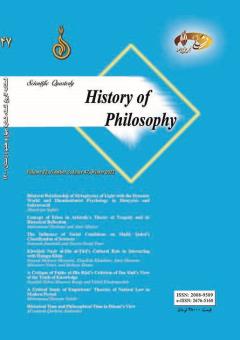Concept of Ethos in Aristotle’s Theory of Tragedy and its Historical Reflection
Subject Areas : ریشهشناسی مکاتب و آراء فلسفی در ادوار قدیم و جدیدMohammad Hashemi 1 , Amir Maziyar 2
1 - PhD candidate of Philosophy of Art, Faculty of Law, Theology, and Political Science, Islamic Azad University, Science and Research Branch, Tehran, Iran
2 - Assistant Professor (corresponding author), Department of Philosophy of Art, Faculty of Theories and Art Studies, Tehran University of Art, Tehran, Iran
Keywords: Aristotle, ethos, Character, action, Poetics, conscious moral choice, principle of ethical middle term,
Abstract :
In Aristotle’s view, an ideal tragic hero must be neither a villain nor a virtuous man but a character who stands between these two extremes based on a conscious process of choice. In order to explain ethos, the study inquires about the roles of conscious ethical choice, external virtues, and the similarities between the hero and the addressee in the unity of action and hero in Aristotle’s view. Moreover, it asks about the basis upon which the historical reflection of this unity can be studied. This paper aims to investigate the relationship between Aristotle’s theory of tragedy and philosophy of ethics and its historical reflection relying on the relationship between act and moral character in his Poetics and the related sections in his other treatises. Here, the author demonstrates that action and hero in a tragedy together present some imitations of the essence and ethical nature of the world. The historical reflection of Aristotle’s ethical approach to tragedy can be studied based on the theories related to the principiality of ethics and the relationship between art and ethics. This qualitative study has been conducted following a descriptive-analytic method.
ارسطو (1392) دربارۀ هنر شعر، ترجمه سهیل افنان، تهران: حکمت.
ارسطو (1393الف) فن شعر، ترجمة عبدالحسین زرین کوب، تهران: امیرکبیر.
ارسطو (1393ب) سیاست، ترجمه حمید عنایت، تهران: علمی و فرهنگی.
ارسطو (1396) خطابه، ترجمة اسماعیل سعادت، تهران: هرمس.
ارسطو (1398) اخلاق نیکوماخوس، ترجمة محمدحسن لطفی، تهران: طرح¬ نو.
افلاطون (1398) جمهوری (دورۀ آثار افلاطون)، ترجمه محمدحسن لطفی و رضا کاویانی، تهران: خوارزمی.
براکت، اسکار (1399) تاریخ تئاتر جهان، ترجمه هوشنگ آزادی¬ور، ج1، تهران: مروارید.
فورستر، ادوارد مورگان (1399) جنبه¬های رمان، ترجمه ابراهیم یونسی، تهران: نگاه.
کارول، نوئل (1390) «هنر و قلمرو اخلاق»، ترجمه یاشار جیرانی، سورۀمهر، شمارة 20، ص174ـ137.
کرمی، محسن (1396) نقد زیباییشناختی و نقد اخلاقی، تهران: نگاه معاصر.
گات، بریس (1393) «هنر و اخلاق»، ترجمة بابک محقق و مسعود قاسمیان، دانشنامۀ زیباییشناسی، تهران: فرهنگستان هنر.
نوسباوم، مارتا (1389) ارسطو، ترجمه عزتالله فولادوند، تهران: طرح نو.
هالیول، استیون (1388) پژوهشی دربارۀ فن شعر ارسطو، ترجمه مهدی نصراللهزاده، تهران: مینوی خرد.
یانگ، جولیان (1395) فلسفۀ تراژدی: از افلاطون تا ژیژک، ترجمه حسن امیری آرا، تهران: ققنوس.
Aristotle (1991a). Eudemian Ethics. trans. by J. Solomon. The Complete Works of Aristotle. ed. by J. Barnes. New Jeresey: Princeton University Press.
Aristotle (1991b). Nicomachean ethics. trans. by W. D. Ross. The Complete Works of Aristotle. ed. by J. Barnes. New Jeresey: Princeton University Press.
Aristotle (1991c). Poetics, trans. by I. Bywater. The Complete Works of Aristotle. ed. by J. Barnes. New Jeresey: Princeton University Press.
Aristotle (1991d). Politics. trans. by B. Jowett. The Complete Works of Aristotle. ed. by J. Barnes.F 4th Edition. Princeton University Press: Princeton.
Aristotle (1991e). Rhetorics. trans. By W. R. Roberts. The Complete Works of Aristotle. ed. by J. Barnes. New Jeresey: Princeton University Press.
Barnes, J. (2000). Aristotle: a very short introduction. London: Oxford University Press.
Belfiore, E. (1984). Aritotle’ Concept of Praxis in the Poetics. The Classical Journal, vol. 79, no. 2. pp. 110-124.
Butcher, S. H. (1951). Aristotle’s theory of poetry and fine art. New York: Dover Publication Inc.
Bywater, I. (1920). Aritotle on the Art of Poetry. London: Oxford Univerity Press.
Dale, A. M. (1959). Ethos and Dianoia: Character and Thouth’ in Aristotle’s Poetics, Journal of Australian Universities Language & Literature Association, vol.11, no. 1. pp. 3-16.
Deslauriers, M. (1990). Character and Explanation in Aristotle’s Etics and Poetics. Dialogue. vol.29, No.1. pp.79-94.
Halliwell, S. (2009). Aristotle’s poetics. London: Gerald Dockworth.
Lucas, D. W. (1962). Pity, Terror and Peripetia. The Classical Quarterly. vol. 12, no. 1. pp. 52-60.
Ross, D. (1995). Aristotle. London: Routledge.
Vernant, Jean-Pierre; & Vidal-Naquet, P. (1996). Myth and Tragedy in ancient Greece. New York: Urzon, Inc.
Winnington-Ingram, R. P. (1998). Sophocles: an interperetation. Cambridge. Cambridge Univerity Press.


